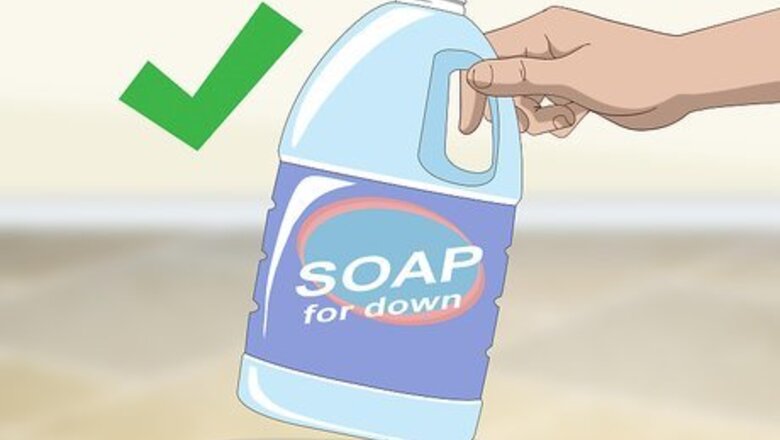
views
Using a Washing Machine
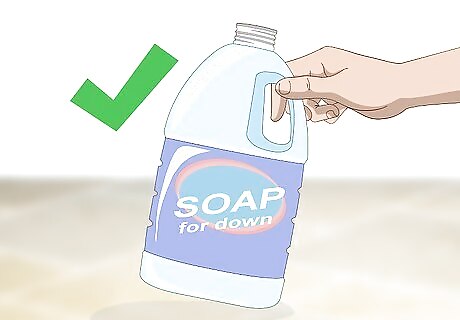
Use soap formulated for a down-filled sleeping bag, if applicable. Only use soap made for washing down material, as it will be gentle on the stuffing in the sleeping bag. Avoid using regular detergents and soaps, as they are too harsh and can damage the down. Look for down soap at your local hardware store or online. Follow the instructions on the label to determine how much soap to use.
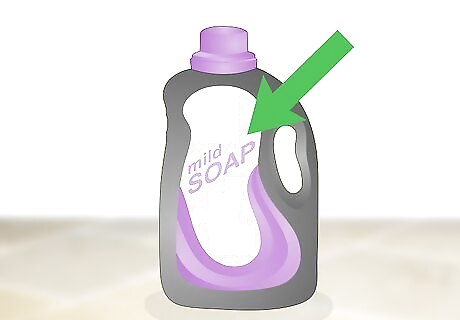
Get soap designed for synthetic materials if the bag isn't made of down. If your sleeping bag is stuffed with synthetic materials, get a fragrance-free soap made for use on synthetic insulation. Check your local superstore or look online for a speciality soap for synthetic materials. You can also use a mild soap like Woolite in a pinch as long as it is fragrance-free. Consult the instructions on the label to determine how much soap to use to clean the sleeping bag. Do not use powdered or liquid laundry detergent, bleach, or fabric softeners on down or synthetic sleeping bags, as they can leave residue behind and ruin the material.
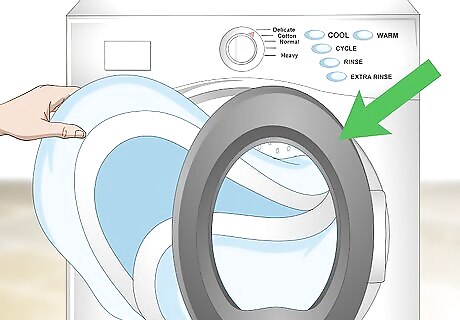
Wash the bag in a front-loading washing machine. If you have a front-loading machine at home, use it to wash the sleeping bag. Go to a laundromat if you do not have a front-loading washing machine, as their commercial-sized front-loading machines will be gentle enough to wash the sleeping bag without damaging it. Do not use a top-loading washer, as it will be too harsh on the sleeping bag and tear the material.
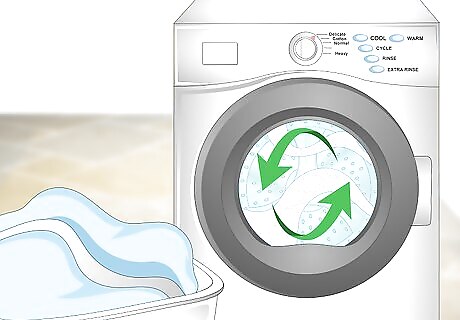
Rinse out the machine by running an empty cycle. Let the machine run once on a gentle cycle with nothing in it. This will remove any soap, residue, or debris in the machine so none of it gets on the sleeping bag.

Turn the sleeping bag inside out if it has a waterproof lining. Turning the sleeping bag inside out will ensure it gets a good clean, as sweat and body oils tend to accumulate inside the bag. Close all the zippers and fasten all the Velcro closures on the sleeping bag. Loosen all the drawstrings so the fabric is exposed, and open the foot vent on the sleeping bag, if there is one. If your sleeping bag does not have a waterproof lining inside, leave it turned right side out.
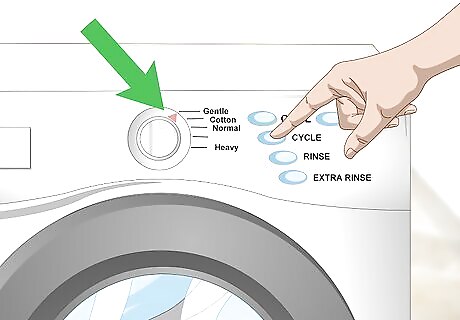
Wash the sleeping bag on a gentle cycle at the lowest temperature. Place the sleeping bag and the soap in the washing machine. Then, set the cycle to gentle or delicate and a low temperature. The wash should take 40-50 minutes, depending on the machine.
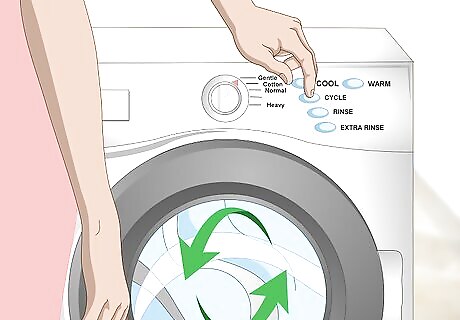
Add an additional rinse cycle to ensure all the soap is removed. Run the machine again once the first wash is done at the same temperature and setting. This will allow the soap to really rinse out of the sleeping bag.
Handwashing the Sleeping Bag
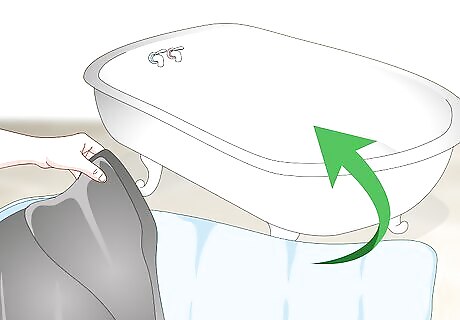
Handwash your sleeping bag if it is not machine washable. If the label on your sleeping bag indicates it is not safe to wash in washer, or if you’d prefer a more delicate approach, do a thorough handwash of the sleeping bag in a bathtub. This method may also be ideal if you are worried about damaging the sleeping bag in the wash or you do not have access to a front loading washer.
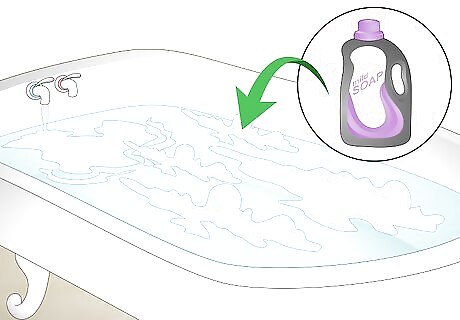
Fill a bathtub with cold water and soap for down or synthetic materials. Use soap made to clean down or synthetic sleeping bags, depending on the type you have. Do not use regular detergent, as it can damage the bag. Put the recommended amount of soap, as specified on the label, into the cold water. Use your hand to lightly stir the soap into the water so it dissolves.
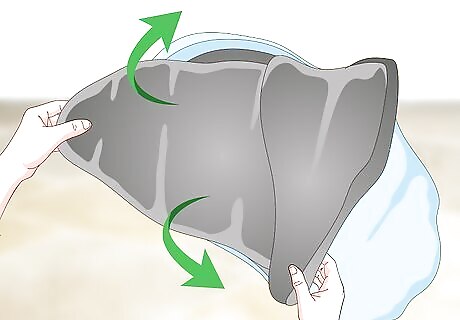
Wash the sleeping bag inside out if it has a waterproof lining. Close the zippers on the bag and fasten the Velcro closures before you put it in the bathwater. If the sleeping bag does not have a waterproof lining inside, leave it right side out when you put it in the water.
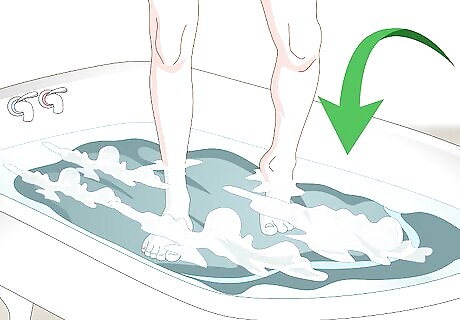
Press the sleeping bag into the water and work the soap into the bag. Use your hands to press the sleeping bag down into the water so it is immersed and fully wet. You can also try walking on the bag gently with bare feet to submerge it. Then, use your hands or feet to move the sleeping bag around in the soapy water. This will help to distribute the soap and clean the bag.
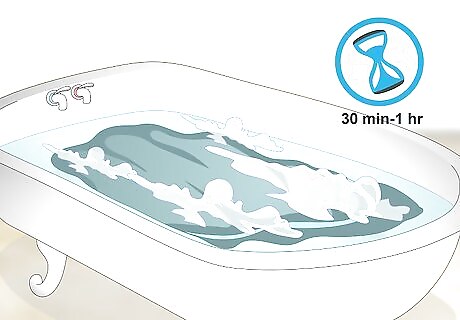
Allow the bag to soak for 30 minutes to 1 hour. Turn the bag periodically as it soaks and move it around in the water so entire bag is exposed to the soap.
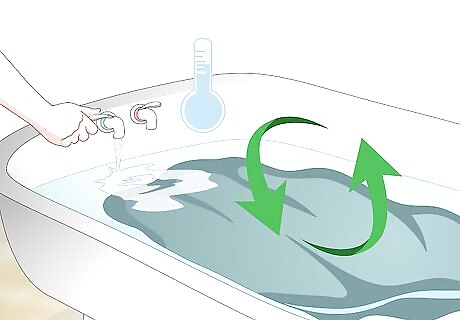
Drain the water and refill the tub with cold water. After the bag has soaked for a while, drain out all the water in the tub. Then, refill the tub with cold water and let the bag sit in the cold water for 5-10 minutes to help remove any remaining soap.
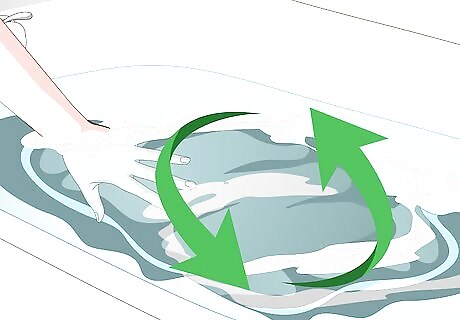
Move the bag around in the water until there is no more soap left. Use your hands, or feet, to move the bag around in the cold water several times. Check the bag to see if it has any remaining soap on it. Continue moving the bag around in the water to rinse it out until all the soap is gone.
Drying the Sleeping Bag
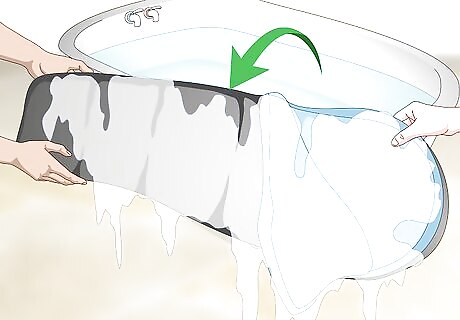
Lift the sleeping bag carefully out of the washer or the tub. The sleeping bag will be very delicate when it is wet so you will need to hold it gently. Try to lift the entire bag at once so it does not drag on the ground. You may need to ask someone to help you lift the sleeping bag out of the washer or tub so it is well supported.
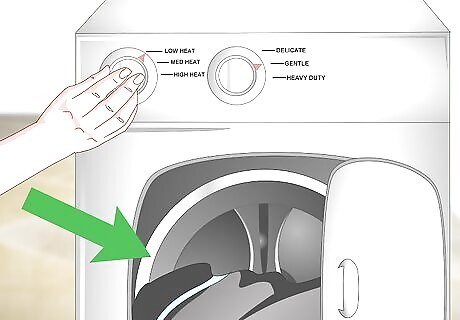
Dry the bag on a low setting in a front-loading dryer for a quick option. Check that the dryer is clean and does not have any debris or sharp corners that might catch on the sleeping bag. Set the dryer to the lowest temperature and place 1-2 absorbent towels and 1-2 tennis balls in with the sleeping bag. Run the dryer for a full cycle. The towels will help to soak up excess water. The tennis balls will help to prevent clumps in the down or synthetic filling in the sleeping bag. Stop the drying cycle periodically and open the door to let some heat out so the sleeping bag does not get too hot, as this can damage it. You may need to dry the sleeping bag for 1-3 cycles to get it completely dry.
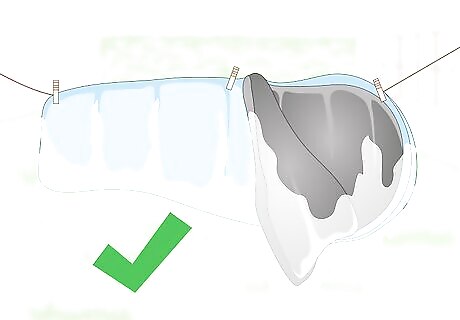
Let the bag air dry if you don’t have access to a front-loading dryer. If you do not want to risk exposing the sleeping bag to the heat of a dryer, place it flat on a clean table or landing outside. You can also hang it on a clothesline to help it dry faster. Position it so it is exposed to direct sunlight for most of the day. It may take 1-2 days for the sleeping bag to air dry completely. If the weather is bad outside, or rain is in the forecast for the next 1-2 days, spread the sleeping bag out indoors so it can dry.
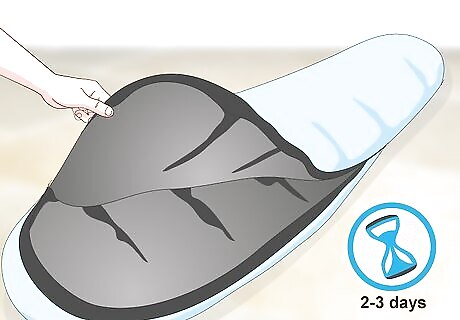
Spread out the bag and let it fluff up for 2-3 days before storing it. Once the sleeping bag is dry, do not roll it up or compress it right away. Instead, leave it spread out on a clean floor or area for several days so the stuffing can fluff up. It should smell clean and feel puffier. Store the sleeping bag flat in a safe, cool spot. You should only compress it or roll it up when you pack it for a trip or for camping.




















Comments
0 comment